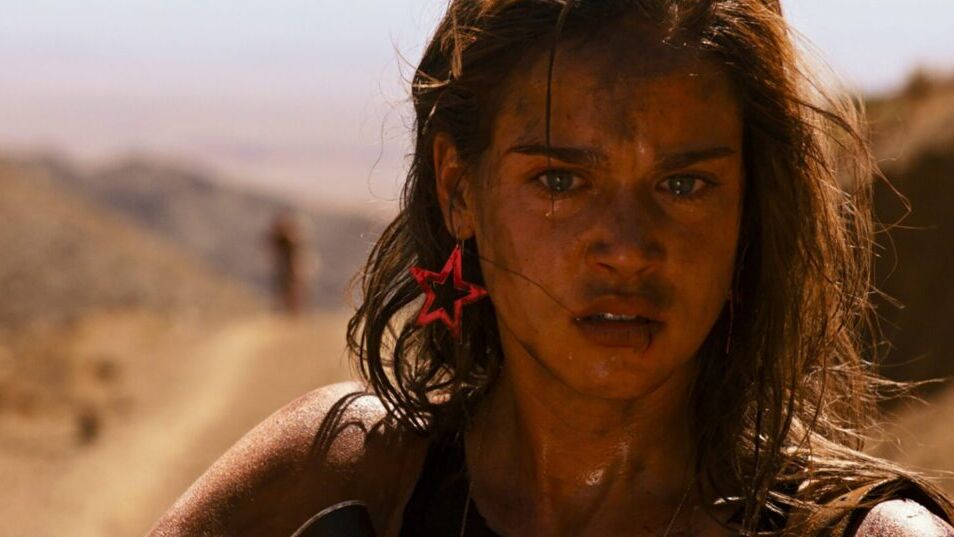I don’t have much trust or love for “rape-revenge” storylines, but after Coralie Fargeat’s debut, I would trust her directorial vision to fill any old genre with furious cinematic life.
Revenge spins such pure, expressive visuals that dialogue feels like a garnish. Take, for instance, the introduction of the leading characters. A helicopter occupies the center of the frame, shuttling Richard (Kevin Janssens), a wealthy Frenchman in pristine, fitted clothes, to his desert hideaway. Behind him sits, Jen (Matilda Lutz), decked out in plastic-y sunglasses, a bright pink top, and star earrings. She is, of course, sucking a lollipop.
Richard has a wife, but Jen is an indulgence– what Richard is to Jen is never entirely clear. Jen dreams of L.A., and Richard seems to be a means to that financial end. When they have sex, she offers him pleasure without seeming to ask for her own. And yet, she appears to genuinely enjoy the flirting and dancing. She plans for a weekend with this sugar daddy, but everything is shaken by the early arrival of Richard’s hunting buddies. The group spends a pivotal night drinking and dancing poolside, which sets all their fates in motion.
The sun-drenched neon colors and centered framing in these early scenes create lush, confident, captivating visuals, but eye candy isn’t the point. Like Jen’s performative sexuality, there always seems to be a greater purpose churning under the surface of the aesthetic choices. For instance, the desert house is full of bright pinks and blues, Jen’s favorite colors. In fact, the windows and pool furniture strongly mimic the pink, blue, gold color scheme of her hair, outfits, and accessories. It’s a clever way of implying that, to Richard, who owns the house, Jen is decorative, like a lounge chair, placed there like any appliance. Yet, it could also foreshadow that Jen will take possession of this world and story, as her color scheme dominates the setting.
After seeing Jen dance, Richard’s bros feel she should be as open to them as any other resource provided by Richard. So, one friend chooses to down beer, inhale candy, and swim. The other rapes Jen.
The treatment of sexual assault in this film has earned favorable comparisons to other stories that see an assaulted person enacting violence against those responsible. That is because, unlike, say, Game of Thrones we aren’t treated to lingering, sexualizing shots of the assault itself. The scene is cold, brutal, and disturbing. Jen’s screams are drowned by a NASCAR-style race blaring on the widescreen TV.
When Jen reports her assault to Richard and demands to leave the desert, he responds, “Baby, baby, baby, don’t act like a child.” Okay, I said earlier that the dialogue felt optional because of the film’s visual strengths, but that’s an all-timer. The script contains such unnerving, condescending misogyny, yet it draws dark comedy out the cartoonish self-involvement of the villains.
Jen may be drawn in the cinematic language of a ditzy sex object, but she is canny and perceptive from the start.
Jen may be drawn in the cinematic language of a ditzy sex object, but she is canny and perceptive from the start. Her distrust toward Richard after this dismissive language is absolute. She runs and the men pursue. Things escalate and a murder attempt transforms Jen into an avenging force. I won’t spoil the gory details, but the rest of the runtime is consumed with callbacks and mirrors to the violence inflicted on Jen. She turns the abuse against her perpetrators in meaningful, well-chosen ways.
My favorite callback comes when, after shooting a bullet into the stomach of one of the men, the flat-screen TV interrupts his screams with the inane babble of a shopping deals channel called “ShopClubUSA”. It’s a delightfully on the nose reversal of the sports channel that tormented and silenced Jen as she was attacked.
Subtlety is not the dish of the day, but that’s welcome when the sounds, settings, costumes, and framings of this sick dreamscape are so hypnotic. This is an over-the-top, searingly violent film whose gory, action thriller pleasures will satisfy many genre fans.
For me, it’s more fun to parse than to actually watch. Revenge’s desert setting and themes of retribution have earned comparison’s to the celebrated Mad Max: Fury Road, one of my favorite films. That film followed the trapped wives, or “prized breeders”, of a dystopian tyrant as they formed an alliance with a mismatched group of road warriors. Revenge does share some of its strengths, but with significant departures. Fury Road’s tale of revenge and justice-seeking is paired with a humanist strain of solidarity and healing. Revenge is a smaller story, sans the armies and unexpected allies of Fury Road’s world.
Maybe I’m a softie at heart, but Revenge is too gonzo and relentless to be an all-time favorite of mine. Likely I’ll always be ill at ease with rape being the turning point for female characters, with that being the act that turns them into a bad-ass to follow into the desert. I will say this film aims to assert that Jen was always confident and worthwhile, but it’s such an uneasy balance. I’m bothered by how violent ruthlessness can be equated with greatness in stories like this, and femininity can be coded as the dull prologue to later feats of heroics. Revenge aims to temper that pitfall in various ways, such as allowing Jen to retain feminine accessories as an action hero.
I’ll leave you with a few Fargeat quotes from a great interview with Seventh Row, where she discussed what it meant for Jen to show such raw power and competence in a bikini:
“I didn’t want a metaphor where, because she becomes stronger, she starts to cover herself. She has her body, and from the beginning to the end, she can do whatever she wants with it. She is who she is, and she can be strong even if she’s still wearing a bikini and is covered in blood.“
“It was important for me to make the message very clear: she can be as sexy and seductive as she wants, it should never be a problem.”– Carolie Fargeat, director/writer
I’m not going to lie, a large percentage of male directors may alert my suspicions if they insisted women bloodied in bikinis represented the height of empowerment. But Fargeat makes a compelling case. I wouldn’t recommend this to the squeamish, but in the age of a resurgent prominence of rape-revenge plotlines, especially on HBO shows like Game of Thrones and Westworld, stylish films by new voices like Fargeat are essential entrants in the discussion.
‘Revenge’ is rated R for strong bloody gruesome violence, a rape, sexuality, graphic nudity, drug use and language. 108 minutes. Now playing at AMC Sunset 5 and Laemmle’s NoHo 7.
Kailee Andrews
Kailee holds a Communication Arts B.A. from the University of Wisconsin. At 21, she programmed her first film festival for an audience of 4,000+ on campus. Since then, it's been all about sharing the cool arts and crafts of cinema.


